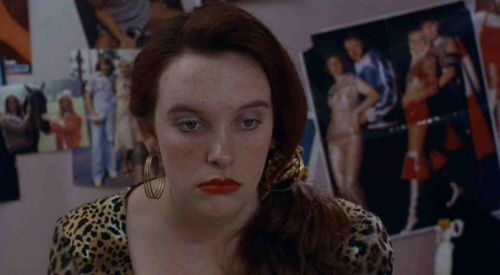 |
| Muriel depressed at home |
Muriel Heslop (Collette, in her first major role) has very little going for her as a wedding movie heroine. According to her friends from her banal suburban hometown of Porpoise Spit, Australia, she is beyond help—as one of them tells her, “You never wear the right clothes. You’re fat. You listen to 70s’ music. You bring us down, Muriel. You embarrass us.” Even if their criticisms are over the top, it’s plain that Muriel is uncomfortable in her own skin—the only moment where she looks relaxed is when she tunes out to Abba music in her bedroom, the walls of which are plastered with pages torn from bridal magazines. “I know I’m not normal,” she says to her bitchy friends, “but I’m trying to change.” “You’ll still be you,” they counter.
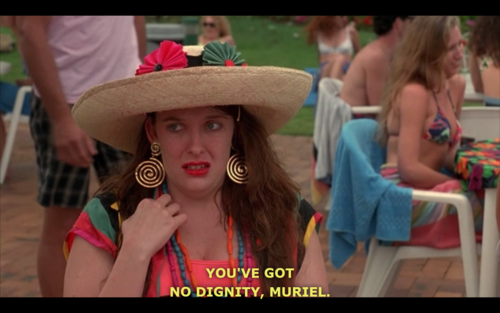 |
| Muriel at resort |
Their criticisms sting as badly as those from her father (Bill Hunter) a local celebrity clinging to his former political glory and doling out heavy psychological abuse to everyone in his family, including his meek and scatterbrained wife Betty (Jeanine Drynan, in a heartbreaking and subtle performance). Muriel yearns to escape from Porpoise Spit, and when her father’s mistress snags her a job as a cosmetics saleswoman, she cashes in her start-up money for a resort vacation to spite her old friends. There she reconnects with a former high school classmate Rhonda (Griffiths), who is nothing like Muriel’s former crowd.
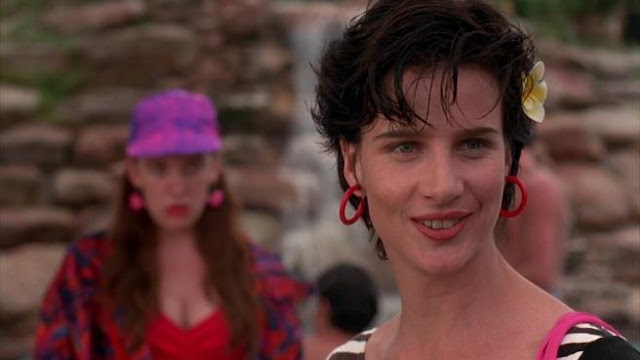 |
| Rachel Griffiths as Rhonda |
Watching Rhonda and Muriel’s first conversation, you can see Muriel peeking out of her shell, as a brand new friend expresses real interest and enthusiasm in her life. Rhonda tells it like it is—she delivers the swift kick to the groin that the terrible Porpoise Spit girls deserve, and we immediately see what a friend like her does to liberate Muriel’s sense of self and fun. Is there anything more satisfying than watching Muriel and Rhonda triumph with their Abba number while the girls tear each other apart?
This is what triumph looks like—not a march down the aisle (we’ll get there later), but a victory dance with someone who matches you, white lame costume and all. The most romantic moment in the movie isn’t between Muriel and her new husband, it’s between Rhonda and Muriel as they celebrate their last night at the resort. Rhonda genuinely admires Muriel—partly for Muriel’s lie about a fiancé, but mostly because she is starting to stand up for herself. “In high school, you were so quiet you could hardly talk,” Rhonda tells her. “You were too shy to look at people . . . You’re not nothing, Muriel. You’ve made it.”
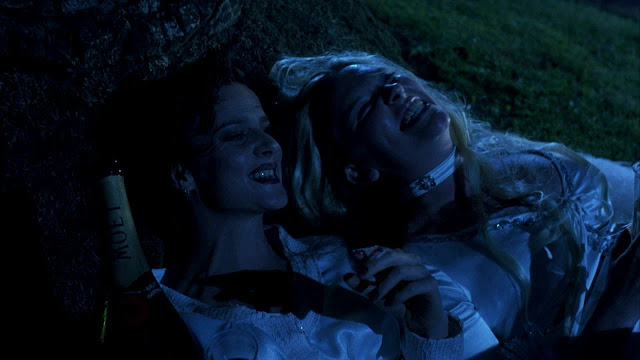 |
| Rhonda and Muriel |
It takes making a true friend like Rhonda to get her to leave her parents’ house and strike out for Sydney, where she gets a job as a video store clerk (right across the street from Rhonda’s job), finds a bit more of her own style, and begins dating. “This is my new life, I’m a new person—I’m changing my name, to Mariel.” Muriel/Mariel finds herself leaping fully into life—and into romance, without hesitating or fearing embarrassment. Even her first sexual encounter is full of joy—especially when she realizes the guy is even more eager to please than she is.
For a brief period, Muriel doesn’t count on Abba or wedding photos to feel good about herself. “Since I’ve met you and moved to Sydney, I haven’t listened to one Abba song,” she tells Rhonda. “That’s because now my life’s as good as an Abba song. It’s as good as ‘Dancing Queen’.” This confidence wanes, however, when Rhonda gets a scary diagnosis that leaves her in a wheelchair. Despondent, Muriel stops into a nearby bridal salon in hopes of comfort, in one of the most fetishistic wedding dress scenes of all time.
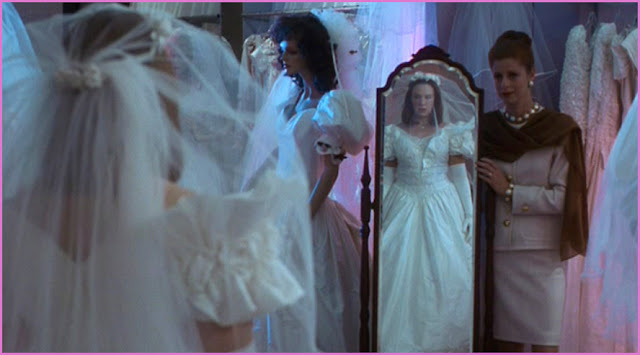 |
| Muriel in wedding dress |
Muriel’s yearning is palpable—she tears up as she’s swathed in silk, completely obsessed with the vision of herself as a beautiful bride. The illusion of desirability is enough to make her happy—for Muriel seeks transformation above all, the ability to feel beautiful and loved and to become Mariel, a bride, anyone except her old self.
When that transformative wedding presents itself, Muriel seizes the opportunity—even if it means marrying a foreign Olympic-level swimmer, David van Arkle (Daniel Lapaine), to help him gain citizenship. The marriage is predicated on a lie, and yet Muriel slips into the arrangement willingly, trading perfect love for a perfect wedding. Because she has such an extreme investment in this new version of herself, she leaves Rhonda behind, and as she walks down the aisle at her wedding (to an Abba tune, of course), she grins so broadly that she looks maniacal.
The wedding, in Muriel’s eyes, is a triumph—but when Rhonda, wheelchair-bound and stuck back in Porpoise Spit confronts her, the victory is suddenly very hollow. “I showed them,” Muriel beams. “Showed them what?” Rhonda asks. Muriel replies, “I’m as good as they are.” Rhonda is appalled. “Mariel van Arkle stinks. And she’s not half the person Muriel Heslop was.”
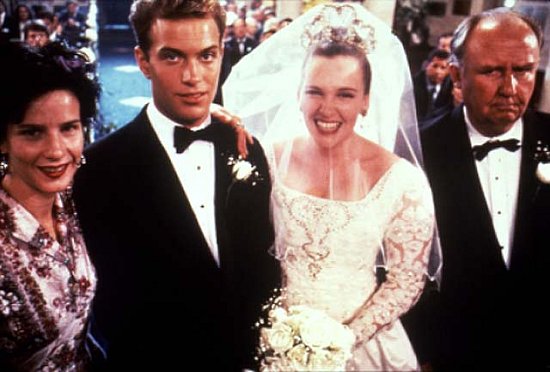 |
| Muriel at altar |
What is marriage supposed to do for a woman who doesn’t know her worth? Does a wedding dress make an ugly person beautiful? Does speaking vows equal promising love? Muriel epitomizes the kind of person who, in lieu of other prospects in her life, waits for the transformative power of her wedding day to find her true self. But this self wasn’t the one who blossomed with Rhonda and a new city—Muriel wanted to have the same success as that of her old friends, to be called successful because she had the marriage and the new name and the status of a beautiful wedding. But on her first night as a married woman, she sleeps alone, her husband a stranger, her friends all absent.
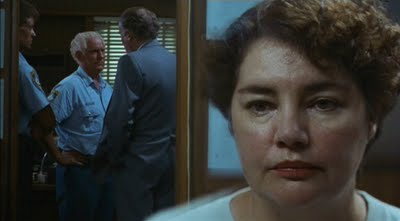 |
| Betty (Muriel’s mom) |
Muriel’s Wedding is basically a cautionary tale about valuing status and reputation over real connection. Muriel knows that she’s happy with Rhonda in Sydney, but by fulfilling her fantasies of beauty, wealth, and romantic achievement, she forgets her real strength: her honesty, decency, and kindness. These strengths were all there in her mother, Betty, whose cruel fate turns the movie from a girly romp into something much more meditative. She is talked over, pushed around, and utterly ignored, invisible even in her own home. Betty barely gets a moment of self-determination before she commits suicide, and her presence is felt most deeply in the frightening image of the Heslop backyard: a swath of literally scorched earth, where nothing can grow if nothing is tended and cared for.
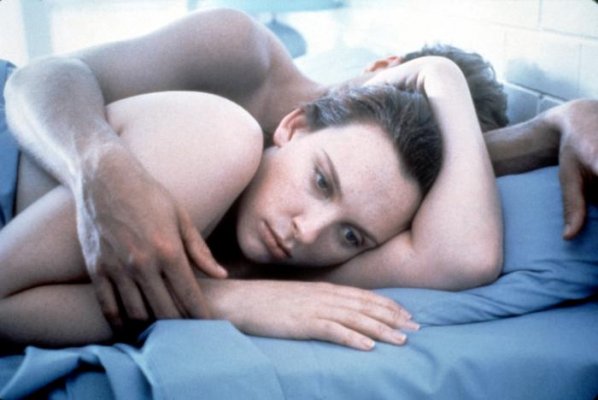 |
| Muriel in bed |
Early in the film, Muriel tells her mom, “I’m gonna get married, and I’m gonna be a success.” And yet, weeping to her unfamiliar husband, Muriel realizes that her success is as thin and insubstantial as bridal organza. Speaking of her father, Muriel wails, “I thought I was so different—a new person. But I’m not. I’m just the same as him.” It takes retreating back to her true self, to calling herself Muriel once more, to actually feel loved, beautiful, and ready to take on the world. And Hogan delivers a finale that satisfies all those cravings.
So ultimately putting Muriel’s Wedding in the wedding movie category is a bit like calling Thelma and Louise a crime thriller. Because the film skewers the narrow way a woman can view her wedding as a Cinderella-like escape, it may be one of the sharpest and smartest satires of our wedding-obsessed culture ever captured on film—and one of the best female empowerment movies ever made. While Muriel may have been a beautiful bride, she makes an even better heroine for single, married, and engaged women everywhere when she ditches the veil, the bouquet, and the bridesmaids, and finally learns to rely on herself.
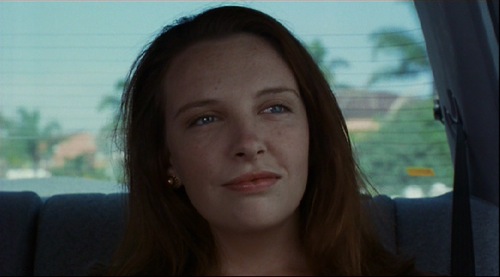 |
| Muriel at end |
